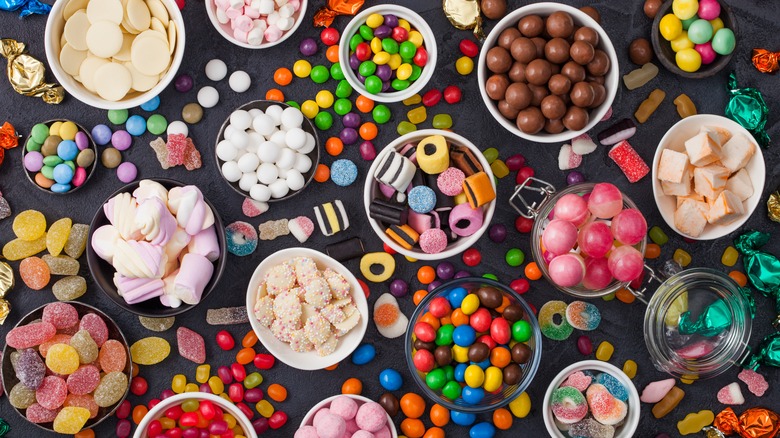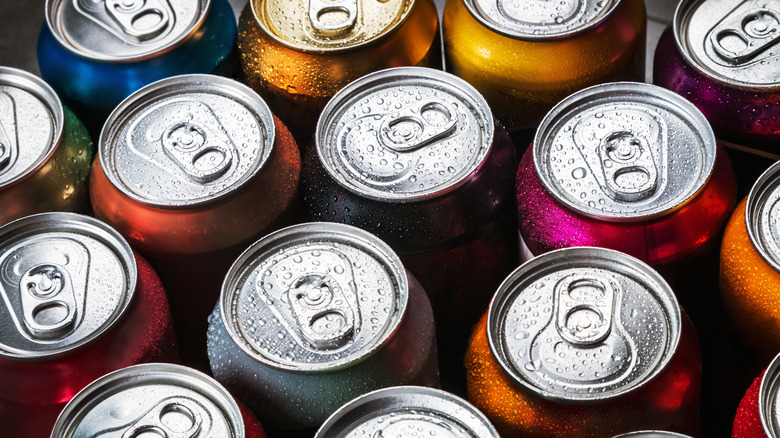This Is The Worst Kind Of Sugar For You, According To A Doctor
We may receive a commission on purchases made from links.
As often as we have heard that too much sugar isn't good for us, we still continue to love it. After all, the world wouldn't be much fun if we didn't have chocolate desserts or a pint of ice cream to make us smile on our saddest days. And while adding a spoonful of sugar to your daily coffee or having an occasional sweet treat isn't bad for you, too much sugar can affect your health. "The effects of added sugar intake — higher blood pressure, inflammation, weight gain, diabetes, and fatty liver disease — are all linked to an increased risk for heart attack and stroke," Dr. Frank Hu, professor of nutrition at the Harvard T.H. Chan School of Public Health, told Harvard Health Publishing.
That being said, you probably didn't know that there are more than 61 names for sugar. In its three simplest forms, it is called glucose (found in plants), fructose (found in honey), and galactose (found in peas), according to Nourish by WebMD. There are also natural sugars, found in fruits, and added sugars, commonly found in soda, and processed foods and desserts.
Though our body digests all sugars similarly, there are some that are more harmful to our health than others. In an exclusive interview with The List, Dr. Mark J. Tager tells us which one of these sweet options is the worst.
This kind of fructose is the worst kind of sugar
According to emedicinehealth, the American Heart Association recommends no more than 24-36 grams of sugar daily, but the average American adult consumes 77 grams daily. Previously, Dr. Mark J. Tager told us how sugar affects aging, and he's back to tell us about the worst kind of sugar.
"We see way too much sucrose consumption in the U.S., but what's become even more pronounced is High-Fructose Corn Syrup (HFCS)," he said. "HFCS, which is very common in processed foods and beverages, is not naturally occurring. The fructose component of HFCS and sucrose can significantly affect metabolism. This contributes to the problem of excess fats in the body."
If you check the nutrition label on packaged foods and drinks, you'll notice many have HFCS listed on them. HFCS is a type of liquid sweetener made from corn (via Healthline). When the price of regular sugar became more expensive in the late 1970s, HFCS became the preferred sweetener because the cost of corn was lower. While this saved the American people a few bucks at the time, it also made us susceptible to different diseases.
Why high fructose corn syrup is bad for your health
Fructose is the kind of sugar that metabolizes in the liver (via Nourish by WebMD). "[It] goes straight to your liver and starts a fat production factory," functional medicine expert Dr. Mark Hyman told Cleveland Clinic. "It triggers the production of triglycerides and cholesterol." Small amounts of HFCS every once in a while likely won't do much harm. But because it is added to so many processed food and drinks, it can be difficult to gauge how much you are actually consuming.
A study published in the journal Frontiers in Nutrition showed that consuming too much HFCS affects the brain's central appetite control function by making people want to eat more, which leads to obesity (via National Library of Medicine). "High fructose corn syrup also contributes to diabetes, inflammation, high triglycerides, and something we call non-alcoholic fatty liver disease," Dr. Hyman said. Non-alcoholic fatty liver disease now affects 90 million people in the country and can lead to liver failure (via Cleveland Clinic).
To learn more about how sugar ages you, check out Dr. Mark J. Tager's book Feed Your Skin Right: Your Personalized Nutrition Plan for Radiant Beauty.


